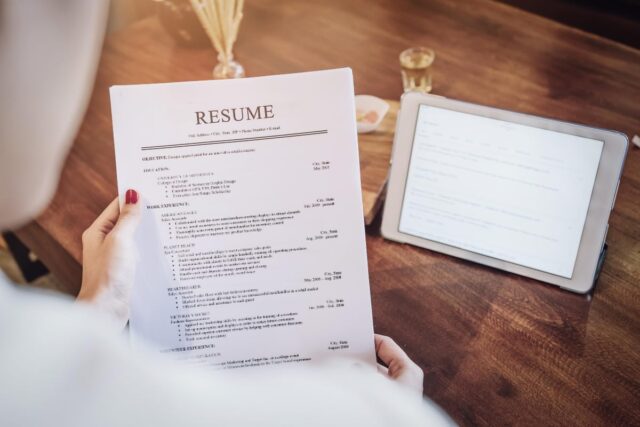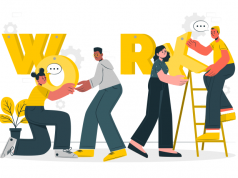
Your resume is the most important document in your professional life. It is your key to the employer. In fact, in most cases, the decision to invite you for an interview is made by employers after reading your resume. A resume is a brief, but quite capacious statement of who you are as a professional and, to some extent, as a person.
A resume is a succinct self-presentation designed for a quick read by an employer. A successful resume will only help you in getting a face-to-face meeting with an employer or their representative, not the job in question. After reading your resume, the employer should conclude that you are the person they are looking for. Resume professional writers can help you with that. In the meantime, we can look at a few recommendations on this.
Why Do We Make Resumes?
Resumes are a crucial tool for any job seeker. It is the first opportunity to make a good impression on a potential employer, and it is essential for promoting your skills and abilities. In addition, a well-crafted resume can help you to stand out from the competition and increase your chances of being called for an interview.
There are many reasons why we make resumes:
- Applying for new jobs is the primary reason for creating resumes.
- Analysis of own work experience, acquired skills, both professional and additional;
- The process of preparing it contributes to systematic career planning, acquisition of professional skills.
What Should Distinguish A Good Resume?

- Conciseness: The length of your resume should not be longer than a single page. A recruiter is dealing with many resumes and usually only looks at the first page of any resume, which is why you must put all the relevant information in a single page.
- Relevance: When creating a resume, focus only on the important information. Write only about what is relevant to the job that you are applying for and avoid unnecessary details.
- Truthfulness. Never lie on your resume. Most recruiters will often ask you to prove the information that you have provided. Failing to do so will make you an untrustworthy candidate and get you disqualified from the job selection process. Provide only the information that you can fully confirm.
- Uniqueness. Write about what characterizes you, what distinguishes you from other candidates.
- Literacy. Check the text for spelling and grammatical errors. Use precise wording, avoid obscure abbreviations.
- Structured. Conveniently arrange the text, dividing it into paragraphs.
Where To Begin?
A resume is a document that succinctly outlines your relevant education, skills, and experience. While there is no one-size-fits-all format, there are certain elements that should be included in every resume. Firstly, your contact information should be prominently displayed at the top of the page.
This includes your name, email address, and phone number. Secondly, you should list your education and any relevant coursework or training. Thirdly, you should outline your professional experience, including job titles, dates of employment, and a brief description of your duties and responsibilities.

Finally, you should list any relevant skills or keywords that would be of interest to a potential employer. By including these essential elements, you can ensure that your resume makes a strong impression and increases your chances of landing an interview.
Be sure to “”voice”” your goal – your desired position. Information about your desired position is very important. It is unlikely that the employer will guess which position that you will be applying for. Let him know that, otherwise it is very likely that your resume will be considered for a position that is not of interest to you. Work Experience.
You need not list all the jobs you have done, start with the most recent. Do not put the same emphasis on all work experience. Highlight the one that is most relevant to the position you want. The rest can make up the “”other experience”” – quite briefly. Don’t forget to describe your most notable professional accomplishments.
If you lack professional experience, you should include all of your work experience on your resume:
- senior year internships
- summer jobs
- assistance to faculty members at a university
- self-employment (include it carefully)
- Any word you may have done while participating in projects
- volunteer work (for example, if you were responsible for organizing events)
- conference, or work for a civic or charitable organization).
You have to show that you are capable of doing work and producing results. Especially highlight any experiences that may be relevant to the job for which you are applying.
Try to break down the description of the job into smaller fragments and proceed to explain them in a detailed manner. It’s not enough to just say you were a secretary.

Divide the job description into functional responsibilities that were responsible for, such as: receiving and answering phone calls, dealing with incoming correspondence, meeting company visitors, etc. You can use the job description to better articulate your experience for a particular job.
Sometimes it is very helpful to use the terms used by the employer in the job description on your resume.
When describing work experience, state:
- period of work
- company name
- company’s field of activity
- position held
- main job duties
- achievements.
If there is no experience at all, then you should describe your education in detail. Education. University, period of study and specialty.
Detailed description in case of lack of experience:
Specify research projects, coursework, diploma works, if the topics correspond to the sphere of future employment. You should not list in your CV all the subjects you studied in higher education. However, if the subject is unusually important to the position you want to pursue, it is worth including it.
Under “Additional education” list only those courses and trainings that meet the intended goal.

Skills. Be sure to indicate technical and computer abilities. If you have worked in groups or have done a project alone (and have had success with it), list “ability to work as part of a team,” or skill to work independently (e.g., as a researcher).












